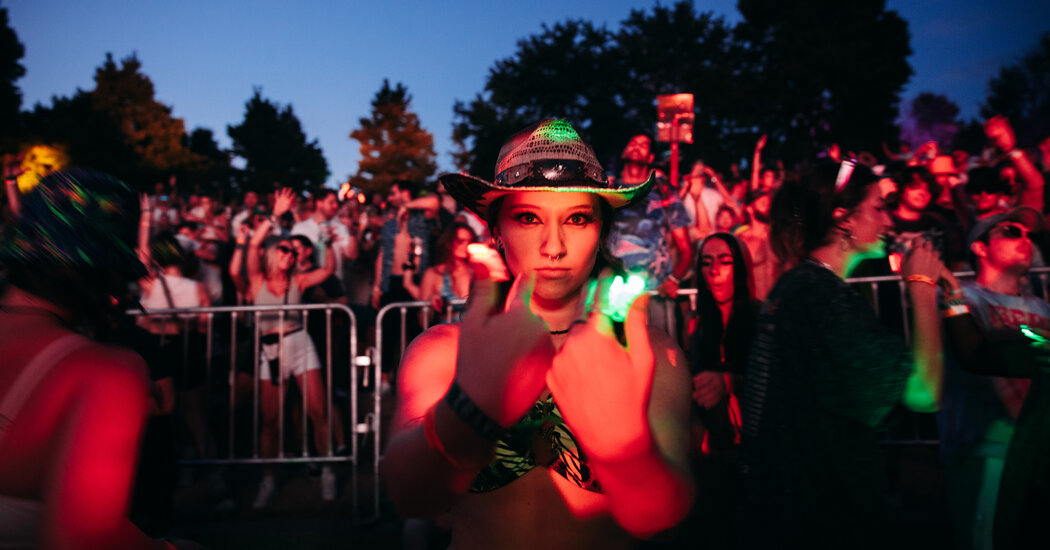
In Nashville this past August, about 5,000 revelers in neon chaps, gothic chains and kaleidoscopic crop tops descended on Bicentennial Park for an electronic music festival. They gyrated to pulsating sets by the British D.J. Chris Lake and the electronic duo Snakehips. They watched choreographed light shows and got massages in a healers’ village.
And when they raised their arms in the air, many of them flashed a green wristband, signifying a commitment to partying in a way that was carbon neutral.
Billed as the “greenest festival” in the country, Deep Tropics had no trash cans (though there were plenty of recycling and compost bins), and single-use plastics were banned. Festival organizers said that all the carbon consumed for the two-day event (including the fuel used by all the festivalgoers) will be offset by the planting of some 23,000 trees.
“We’re the next generation of festivals,” said Blake Atchinson, 39, who founded Deep Tropics in 2017 with his twin brother, Joel Atchinson. “We are trying to be on the cutting edge of technology and culture and sustainability and art.”
Traditional music festivals consume a lot of resources. The sound systems and lights alone guzzle tons of power. Bigger festivals like Lollapalooza and Tomorrowland draw hundreds of thousands of revelers, who use energy to get there and leave behind mountains of waste. What isn’t carried in by hand needs to be trucked in.
And that’s not counting the D.J.s. A 2021 report by Clean Scene, a climate collective in Berlin, found that 1,000 of the top D.J.s together took more than 51,000 flights in a single year, emitting 35 million tons of carbon dioxide — equivalent to the amount of power consumed by 20,000 households.
But there is a novel push by eco-minded organizers to make festivals greener, sometimes through smaller, feel-good initiatives like compost toilets and vegan food trucks. Others are striving for bigger impact by offsetting their carbon emissions, or tapping dancers’ body heat to power their heating and cooling systems.
“There’s pressure on festivals, especially because they’re such large events,” said Fallon MacWilliams, 37, a D.J. and promoter in Berlin who is one of the three founders of Clean Scene. “This year while touring I saw a lot of festivals changing the way they’re doing things when it comes to plastic and encouraging artists to take trains to the festival.”
Vision: 2025, a nonprofit in Bristol, England, has gotten more than 40 festivals in Britain to pledge to cut their emissions in half and double their recycling rates by 2025. Daybreaker, which organizes sober dance parties worldwide, hosts a series of morning raves where single-use plastics are prohibited and public transportation is encouraged.
Some festival organizers say the changes need to be more systemic. Music festivals are “completely dependent on cheap flights and therefore the consumption of fossil fuels,” said Eilidh McLaughlin, 35, a founder of Clean Scene. “Any effort to advance sustainability is essentially greenwashing unless you are working to actively break the cycle and reduce your carbon footprint by touring more sustainably.”
In 2020, DGTL, an organization in Amsterdam that produces electronic music festivals, pledged to be climate neutral. “We are trying to create a new festival landscape where sustainability will be the norm,” said Mitchell van Dooijeweerd, 31, the sustainability manager for DGTL. “It’s become a business model, because we are experts in this and everybody wants to change.”
For this year’s Deep Tropics, the organizers teamed with Green Disco, a company in New York that helps events become environmentally friendlier. During the festival, its founders Jonah Geschwind, 22, and Jacob Chandler, 21, stood at the entrance and sold $20 “eco-bands”: green wristbands that funded the planting of trees and other environmental causes.
“If you make sustainability easy and as cool as possible, people are going to naturally adopt it,” said Mr. Chandler, who said they sold about 500 bracelets, which he estimates will offset 400 metric tons of carbon dioxide.
Bigger festivals are also making efforts: Coachella has increased vegan food options, urged its attendees to car pool and pledged to slash emissions; Burning Man announced a 10-year sustainability road map in 2019.
And some music acts are trying, too. Coldplay has pledged that its current tour will create half as much greenhouse gas emissions as its previous one. The band is also touring with a kinetic dance floor that uses human movement to create electricity. The floor was a previous attraction at Club Watt, a dance club in Rotterdam that’s now closed.
Still, real-world practicalities sometimes get in the way. At this year’s Burning Man there were 12-hour traffic jams, leaving ravers stuck in hot, idling cars while Nevada temperatures crept above 100 degrees. And at Deep Tropics, some vendors used plastic packaging despite signing pledges.
That doesn’t mean progress isn’t being made, said Heather White, 49, an environmental scientist in Bozeman, Mont., and founder of the nonprofit One Green Thing.
“From a 30,000-foot level, does all this matter?” she said. “It absolutely matters. These electronic music festivals are drivers of culture change. We have to have these living laboratories, where people can see zero waste at a concert, because without culture change, big policy solutions are not going to work.”




